The Best American Noir of The Century
Review
The Best American Noir of The Century
In his foreword to THE BEST AMERICAN NOIR OF THE CENTURY, Otto Penzler advises us that while noir is indefinable, they are existential, pessimistic works about people, including protagonists who are seriously flawed and morally questionable, and shot through with a tone that is generally bleak and nihilistic. Indeed, this 700-plus-page collection of stories, exquisitely selected and introduced by Penzler and co-editor (as well as contributor) James Ellroy, is a tour of the nightmares of the human condition, played out against a host of scenarios. Lest you think that by “century” this book is limited to the 1900s, the tales here run from 1923 to 2007 and quite wisely are presented in chronological order.
There is no good place to stop reading before the last page of “Missing the Morning Bus” by Lorenzo Carcaterra, the concluding story in the collection, a state of affairs that kept me reading deeply into the night on consecutive evenings, at one point feeling like a child asking a parent for “Just one more story. Please.” Penzler and Ellroy are the parents in this case. Penzler, of course, is as responsible as anyone for shaping and sustaining the popularity of noir fiction in any number of ways, from his landmark Mysterious Bookshop to his Mysterious Press imprint, and, of course, his editing of anthologies such as this one. Ellroy has arguably exercised the greatest influence of any author over modern noir writing over the past 20 or so years.
The greatest point of interest in this collection is that it is culled entirely from short fiction. Many of the authors here are more immediately associated with longer works, and some are not known for their noir. The result is a wondrous combination of unfamiliar works by familiar authors and the opportunity to visit or revisit a number of names that have been forgotten or neglected. David Morrell, by virtue of his classic FIRST BLOOD, is regarded as the father of the modern-action novel, yet his frightening story, “The Dripping,” is one of the best in the collection. It is a dark and disturbing tale of a man who returns home to find his world turned horrifically and irrevocably upside down. An example of a neglected author, on the other hand, is MacKinlay Kantor, whose success in mainstream novels eclipsed the fact that he wrote several excellent crime and police procedural works. His outstanding “Gun Crazy,” about childhood friends who experience a rough day of reckoning as adults, is included here.
There are also household names you would expect to see, such as Mickey Spillane (“The Lady Says Die!”) and Jim Thompson (“Forever After”). And then there are some wonderful surprises. “The Weekender” by Jeffery Deaver is unexpected, but more than earns its place here, as does “Faithless” by Joyce Carol Oates and the classic “Poachers” by Tom Franklin.
My favorites? It’s a difficult call. In addition to “The Dripping,” “Texas City, 1947” by James Lee Burke is a brooding and quietly explosive coming-of-age tale that will coat your skin in a thin sheath of ice and bring tears to your eyes. And of course, there is “Spurs” by Tod Robbins. This story of passion, romance and murder, which concerns itself with the participants of a traveling circus sideshow first published in 1923, became the basis for the movie Freaks, one of those films that arguably more people have heard of than have actually seen. It is worth noting that “Spurs,” published over 80 years ago, still manages in its way to be shocking. And if I may be permitted one more, “Professional Man” by David Goodis is a 1953 gem concerning a hit man caught in a situation from which, for himself and the woman he loves, there is no good way out.
At some point I would like to see a collection devoted to noir short fiction on an international scale, but Penzler and Ellroy have certainly provided a grand sampling here, of which I have only scratched the surface. The introduction given to each story also provides enough reference to keep anyone busy for years, literally, reading old novels from the bibliographies of the authors assembled. It simply doesn’t get any better than this.
Reviewed by Joe Hartlaub on January 5, 2011






